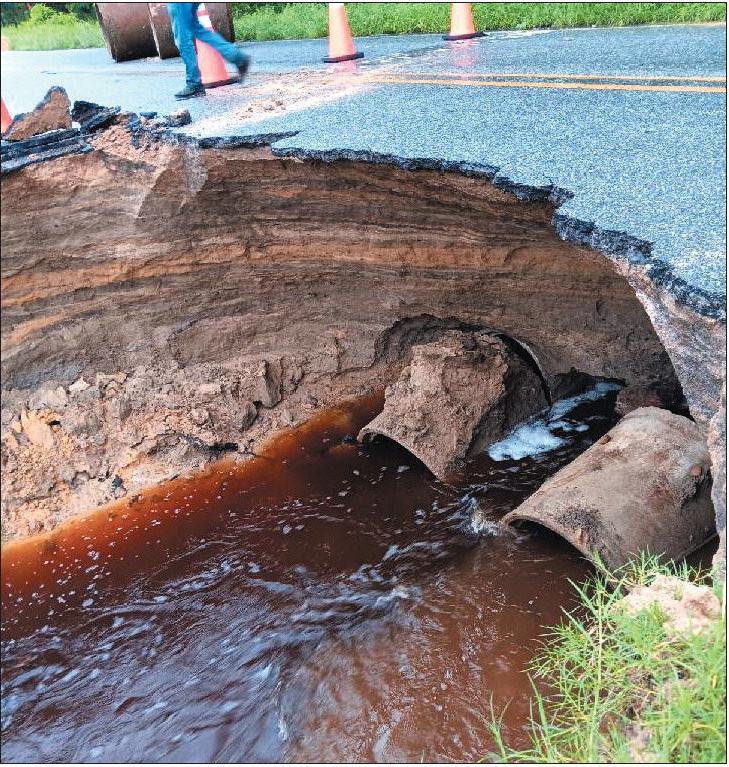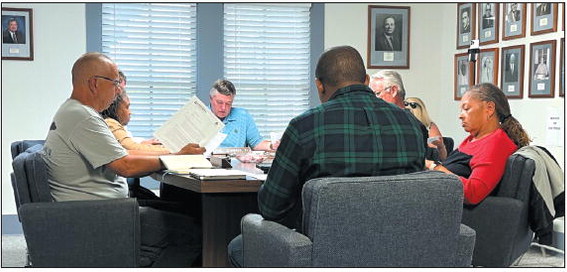Washed Out


Tropical Storm Debby brought massive amounts of rain to Wheeler, Montgomery, and Toombs Counties, resulting in several road and school closures. Yet, these counties were among some of the least hard-hit areas, as Governor Brian Kemp has extended the State of Emergency issued ahead of the storm, making state resources available to local governments and entities within the storm impact area until Thursday, August 15.
Wheeler County dodged a bullet when Tropical Storm Debby blew through the area Monday and Tuesday, said EMA Director Steve Adams. Except for a washout on Ochwalkee Road, only minor flooding occurred.
Stuckey Fire Chief Amber Womack said she was returning from a call regarding a downed tree on Georgia Highway 19 when she came within a few feet of driving into a hole on Ochwalkee Road where the paved road crosses a small creek. Heavy rains had resulted in a blowout which took out a large chuck of the road. The heavily-travelled connection from U.S. Highway 280 and continued from page
Georgia Highway 19 will be closed to through traffic and barricaded near the damage until repairs can be made.
The Wheeler County Sheriff’s Office said a few power outages occurred, but were quickly addressed by crews working for Little Ocmulgee EMC and Georgia Power. Wheeler County Schools were closed Monday and Tuesday out of an abundance of caution due to the weather, delaying the start of the new term until Wednesday, August 7.
Montgomery County Emergency Management Director Donnie Daniels reported similar results of the storm across the county line in his area, as several dirt roads were negatively impacted by the increased rainfall.
At one point, several roads were closed, including the west end of Bob Sharpe Road, portions of Adams Road, Eddie Clyde Road, Browning Road, Hack Branch Road, Alston-Long Pond Road, Salem Road, and more. The county worked quickly to attempt to repair the storm damage and place adequate signage to warn the public of the conditions.
Over 40 trees fell within the county, which were also cleared by authorities when possible.
The Montgomery County School System encouraged students and staff members to stay home during the storm, as the schools were closed throughout the week until Thursday, August 8.
Schools within Toombs County were also closed for the storm, as Vidalia City Schools and Robert Toombs Christian Academy did not reopen for the week until Wednesday, August 7, and Toombs County Schools delayed their annual open house until Thursday, August 8, which pushed back their first day of classes until Friday, August 9.
Toombs County Emergency Management Agency Director Lynn Moore echoed his fellow EMA directors, stating that minor flooding was the biggest issue which the area faced. This flooding caused several road closures, such as the closures of Orange Street, Cadillac Drive, Scott Drive, Zigman Whonic Road, and more.
Few power outages were reported by Georgia Power and Altamaha EMC for Montgomery and Toombs Counties, and officials for both companies stated that power was quickly restored when safe to do so.
On Friday, August 9, the Governor joined state and local emergency management officials, local leaders, and others in Savannah to provide an update on the response to damage from Debby.
“While the worst of Debby has passed, this remains an active situation,” said Governor Kemp in a press release issued by his office August 9. “I'm grateful for all of our first responders, utility providers, and others who have already been in impacted areas ensuring people are safe, roads are passable, and necessary repairs are made. We want to encourage all Georgians affected by the storm to be patient in allowing these men and women to do their work and return communities to full operation.'
The State Operations Center activated over the weekend preceding the storm allowed the state to move resources ahead of the storm. A State of Emergency was issued Saturday, August 3, making state resources available to local governments in impacted areas. On Monday, August 5, the Governor issued an additional executive order enabling the Georgia National Guard to call up troops. The Governor approved pre-positioning of close to 300 troops in strategic areas and asked the Federal Emergency Management Agency (FEMA) on Monday to grant Georgia a pre-impact emergency declaration to further help get resources where they needed to go, which was approved. On Wednesday, August 7, the Governor extended the State of Emergency to Thursday, August 15.
Georgia Emergency Management Agency (GEMA) and the Office of Homeland Security are actively working with federal, state, and local partners to determine best steps to keep Georgians safe. To assess impending crises and post-storm damage, Air Operations conducted 10 drone missions and five manned missions. Firefighting placed one large irrigation pump in Effingham County where massive flooding occurred.
The Georgia National Guard’s response effort consisted of a team of approximately 300 soldiers and airmen drawn from armories and units across the state who answered emergency assistance requests in Screven, Bulloch, Pierce, and Wayne counties. Their missions ranged from route clearance and road repair in rural areas to transport of emergency supplies using high-water vehicles and trained engineers while working with local agencies and the Georgia Department of Transportation (GDOT) to provide the maximum response to Georgians. GDOT crews are assessing impacts on roads and bridges in communities affected by Debby.
The state’s Department of Natural Resources (DNR) stood up an Incident Command Post at Little Ocmulgee State Park in Wheeler County at noon on Monday, August 5. DNR was ready to respond for search and rescue, to clear roads, conduct water rescues, provide security, and deliver critical supplies. Initial teams staged at Little Ocmulgee and at Abraham Baldwin College in Tifton, with the Little O teams shifting to Jack Hill and George L. Smith State Parks on August 6 to be closer to impacted areas.
DNR’s Law Enforcement Division responded to a number of calls and requests, including evacuations in Evans County as the Canoochee River crested at record flood stage, staging boats in Screven County as concerns of dam failure at Lake Eureka rose, assisting Glynn County with a vehicle that left the roadway, and in Pierce County to assist with traffic due to water over a roadway.
DNR’s State Parks Division saw 90 reservations made by evacuees from Florida seeking lodging at Georgia state parks. DNR’s Wildlife Resources Division provided debris removal in Lowndes County at Grand Bay WMA. Department of Public Safety monitored roads, checked bridges, and helped maintain a list of roads closures.
The Georgia Department of Agriculture is continuing to work with state, federal, and industry partners to promote the safety of citizens, evacuees, livestock, and companion animals. GDA is also monitoring the Cypress Lake area in Bulloch County. Current impacts to agriculture products are as follows: ere were impacts to corn, cotton, peanut, and other crops (collard greens, turnips) 54,000 chickens lost: 5,000 from heat; 49,000 from drowning in Irwin County Lowndes County lost pecan crops Screven County lost
peanuts
One farmer lost 25% from his 700-acre farm.
Ta(nall County lost pecan and poultry omas County lost
citrus
Wayne County lost
tobacco

SURVEYING STORM IMPACT – Governor Brian Kemp and his wife, Marty, took a helicopter flight on Friday, August 9, to survey damage brought about by Tropical Storm Debby. The Governor met with a post-hurricane evaluation team in Savannah to discuss emergency response measures. The governor extended the state of emergency status in Georgia to Thursday, August 15.







